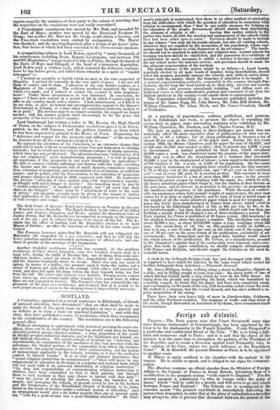IRELAND.
The Free-traders of Dublin claim a great triumph in the result of a meeting in the Rotunda, on Monday, which had been convened by the Lord Mayor, Mr. John Reynolds, Ma, as a public meeting "to ascertain the true feelings of the public on the all-important subject of free trade." In the course of the late Protectionist demonstration in the Rotunda, Mr. Isaac Butt, Q.C., declared himself ready to abide by the ordeal of a public discussion with the Free-traders : when, therefore, the present meet- ing was proposed, its promoters reminded Mr. Butt of his engagement, and he declared that he would stand by his challenge. Both parties made great preparations to be backed by a favourable audience : the ad- missions to the Rotunda were by ticket, and the platform was crowded by about an equal proportion of respectable Free-traders and Protectionists ; it was a preponderance of Anti-Protectionist opinion in the crowd of porters, coalh.eavers, and persons of that industrial grade which ob- tained for the Free-traders their "success." Among the body of the audience were several men bearing a "little loaf in juxtaposition with a big loaf"; and, as an improvement upon Mr. Cobden's revival of this mode of appealing to the reason, a sack full of loaves, big and litlie, was laid upon the front of the platform for general resort by the speakers on either side of the question : we learn that one orator dramatically poised the bulky and diminutive comestibles in sarcastic contrast; Mr. Tresham Gregg used specimens of each dimension as missiles, and the Lord Mayor Chairman was enabled to secure the silence of more than one interrupter by threatening the experiment of closing his mouth with a small loaf." The Protectionist party were headed by Mr. Isaac Butt, the Earl of Mayo, Archdeacon Magee, the Reverend Tresham D. Gregg, Mr. Edward Gro- gan, M.P., and Mr. Thomas Ball, son of the Judge ; and in the body of the hall, which will hold 3,000 person "there must have been an im- mense number," says the report of the Standard; indeed the Protectionist
reports magnify the numbers of their party to the extent of asserting that the majorities on the resolutions were not easily ascertained.
A Protectionist amendment was moved by Mr. Butt, and seconded by the Earl of Mayo ; another was moved by the Reverend Troshaur D. Gregg ; but neither Mr. Butt nor Mr. Gregg could obtain a hearing, and the Free-trade resolutions were carried by acclamation. The Mayor was thanked ; mad the meeting dispersed, after a debate of six hours' dura- tion, four hours of which had been conceded to the Protectionist speakers.
A sympathizing address to Lord Roden, signed by "many thousands of his countrymen, including Peers, Deputy-Lieutenants, and between 700 and 800 Magistrates," was presented to him. on Friday, through the hands of the Earls of Mayo and Glengall, at the head of a numerous deputation. Lord Roden read a written reply, which repeated the defensive explana- tions he has before given, and added these remarks in a spirit of candid retrospect"— "I treated an assembly as lawful which no man at the time suspected of illegality. I advised the assembly in the very spirit of peace. I did not tell them to scatter and be shin. I attended at my own district sessions as a Magistrate of the county. The evidence produced negatived the charge which was made, and I refused to submit the accused to false imprison- ment." Under these circumstances he was dismissed. In conclusion, he says—" I have now arrived at a period of life in which I cannot expect to offer to my country much active service. I had endeavoured, as I felt it to be my duty, to give an honest and uncompromising support to the Queen's Government in Ireland, at a time when all constituted authority seemed to be rea" His sermes may be no longer available, his support no longer needed; still his earnest prayers shall unceasingly be for the peace and prosperity of his beloved native country.
Lord Castlereagh has written a letter to Mr. Koren, the High Sheriff of Down, on the subject of Protectionist resolutions agreed to at Down- patrick on the 10th January, and the petition founded on them which he has been requested to present to the House of Peers. Expressing his ." deference and respect for the property and influence" of the meeting, he dissents from all the conclusions adopted by it— He opposed the alteration of the Corn-laws, as an extensive change that could not be made without occasioning severe lose and depression to existing interests ; but he would not now retract without evidence of strong necessity, which time has not yet disclosed. The alteration has been "followed by, if it has not originated," great manufacturing prosperity ; "it will be against all experience if this prosperity do not react beneficially on agriculture." He fails to connect existing sufferings and distress with free trade; recalling the famine and the consequent ruin of small farmers, compulsory emigra- tion, extension of pauperism, and accumulation of local burdens, as sufficient causes : and he points, with the Free-traders, to the reduction of pauperism and pauper charges in Ireland in 1849, compared with 1848. He deprecates the present arraying of elms against clam with unprecedented asperity, as fraught with much danger to society." The transition must be met by "cordial cooperation" of landlord and tenant, and "all murk take their share in the struggle" ; there must be "adjustment of rents to the scale of prices," and adequate security must be given to the tenant to induce that application of his skill and capital which will best promote the interest of both occupier and owner.
The Irish Court of Queen's Bench gave judgment OD Tuesday in the case of Wauchob versus Reynolds. The Bench decided, by the voices of the Chief Justice and Justices anmpton and Moore, against the dissentient voice of Justice Perrin, that Mr. Reynolds was incompetent to remain on the burgess- roll of the city ; and it ordered his name to be struck off the list. The de- cision has the effect of making void Mr. Reynolds's election to be Lord Mayor of Dublin ; an office the functions of which he has some weeks per- formed.
The Freeman, however, states that Mr. Reynolds will not relinquish the Mayoralty till compelled by a gee tearranto ; and that he will risk the heavy penalties against unwarranted performance of official acts, and con- tinue to preside at the meetings of the Corporation.
Another frightful workhouse accident has occurred. At the auxiliary workhouse in Clare Street, Limerick, some five hundred women slept in a large loft, during the night of Tuesday last, one of them, from some mis- chievous motive, raised an alarm of fire ; immediately all was confusion, and the inmates frantically strove to escape. There was only one mode of egress, by means of a ladder; the pressure upon it broke the ladder, and a crowd of women and girls fell to the ground, while others still pressed for- ward, and thus fell upon the heap below, the floor beneath being ten feet from the loft. The terror and clamour were horrible. Twenty-seven corpses were taken up, and twenty-eight other females were much hurt, of whom three are not expected to recover. The Coroner's Jury has censured the em- ployment of the place as a workhouse, and declared that if it is still to be used proper means of access to the sleeping-room is imperatively necessary.



























 Previous page
Previous page